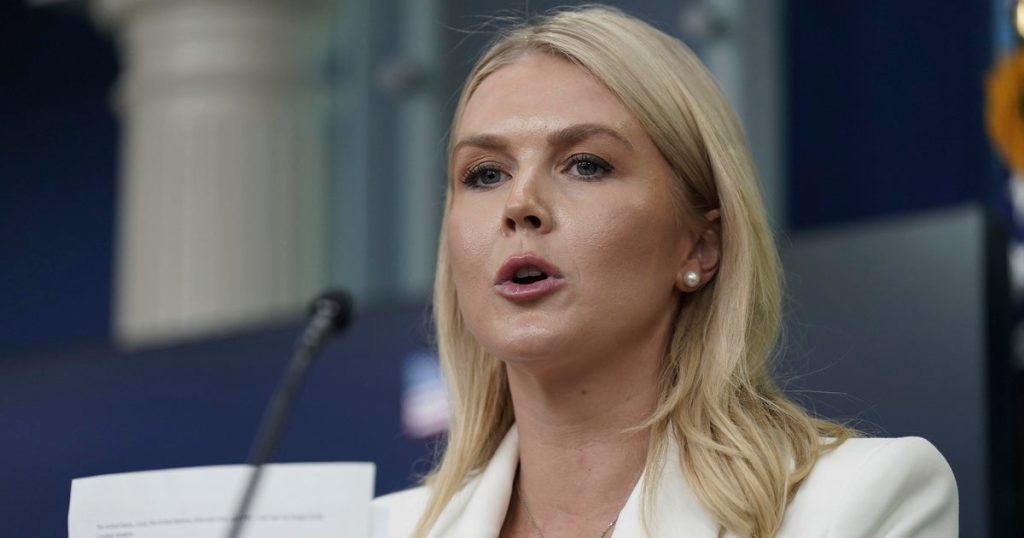In recent developments, the White House has clarified the status of potential meetings between the United States and Iran. Following statements made by President Trump regarding talks scheduled for next week, White House press secretary Karoline Leavitt confirmed that no formal meetings are currently set. The ongoing dialogue with Iranian representatives and intermediaries, however, remains active as the U.S. aims to address critical issues related to Iran’s nuclear program.
| Article Subheadings |
|---|
| 1) Clarification from the White House |
| 2) President Trump’s Claims |
| 3) The Role of U.S. Diplomacy |
| 4) Objectives for Future Meetings |
| 5) Defense of Military Actions |
Clarification from the White House
White House press secretary Karoline Leavitt took to the podium during a recent press briefing to address the state of U.S.-Iran relations. After President Trump’s announcement of upcoming discussions, she was quick to clarify that, as of now, there are no confirmed meetings scheduled with Iranian officials. Leavitt emphasized that the U.S. administration is maintaining an open line of communication with Iran, facilitated by intermediaries like the Qatari government. This reflects an ongoing diplomatic effort amidst tensions surrounding Iran’s nuclear capabilities.
President Trump’s Claims
During a news conference at the NATO summit held in The Hague, President Trump expressed optimism regarding talks with Iran, suggesting that meetings could occur as early as next week. He mentioned, “We’re going to talk to them next week, with Iran,” indicating that a formal agreement might be on the horizon, although he did not provide specific details about who would participate or where the talks would take place. The president’s statements have added complexity to the diplomatic landscape, especially given the surrounding military actions aimed at Iranian nuclear facilities.
The Role of U.S. Diplomacy
The U.S. has consistently sought a diplomatic resolution concerning Iran’s nuclear ambitions. Secretary of State Marco Rubio remarked on the show “Face the Nation,” that the U.S. has been open to negotiation, stating emphatically, “we have bent over backwards to create a deal with these people.” This reflects a broader strategy to engage diplomatically while also maintaining a stance of readiness to respond to any aggressive actions taken by Iran. Officials highlight that much depends on Iran’s willingness to engage in constructive dialogue moving forward.
Objectives for Future Meetings
White House officials, including Leavitt, outlined key objectives for any potential meetings with Iranian representatives. The administration’s primary goal is to attain assurances that Iran’s nuclear program remains non-enrichment based and restricted to civilian uses. In her address, Leavitt was clear about the administration’s intentions, asserting that “we want to ensure we can get to a place where Iran agrees to a non-enrichment, civil nuclear program.” The U.S. also has various other demands from Iran, underscoring the complexity of any forthcoming negotiations.
Defense of Military Actions
Concurrent with the diplomatic efforts, the Pentagon recently defended its military actions targeting Iranian nuclear facilities over the weekend. Officials conveyed that these strikes were integral to U.S. national security interests and aimed at impacting Iran’s capability to develop nuclear weapons. Following these actions, the Pentagon scheduled a briefing with lawmakers to discuss the strategic implications. Administration officials continue to stress that military options remain available as they aim to navigate this high-stakes geopolitical landscape.
| No. | Key Points |
|---|---|
| 1 | The White House has not confirmed any upcoming meetings with Iran, contrary to President Trump’s statements. |
| 2 | Ongoing communication with Iranian intermediaries, including Qatar, continues as part of U.S. diplomatic efforts. |
| 3 | Discussions aim to ensure Iran’s nuclear program is limited to civilian use and non-enrichment. |
| 4 | Recent U.S. military strikes against Iranian facilities are framed as necessary for national security. |
| 5 | The outcome of potential negotiations largely rests on Iran’s willingness to engage diplomatically. |
Summary
The recent statements from the White House reveal a complicated landscape in U.S.-Iran relations, marked by an ongoing tension between military actions and diplomatic overtures. While President Trump’s remarks suggested a pathway to discussions, officials have clarified that no formal meetings are currently scheduled. As the U.S. aims to navigate these complex dynamics, the focus remains on achieving a peaceful resolution to Iran’s nuclear ambitions, with both military readiness and diplomatic engagement being key elements of the strategy.
Frequently Asked Questions
Question: What are the main objectives of the upcoming talks with Iran?
The primary objective is to secure an agreement that ensures Iran’s nuclear program is non-enrichment based and limited to civilian uses.
Question: Why is the U.S. emphasizing military action against Iran?
The U.S. views military action as a necessary measure for national security, particularly to address threats posed by Iran’s nuclear capabilities.
Question: How has the U.S. communicated with Iran lately?
The U.S. has maintained open lines of communication through intermediaries such as the Qatari government while engaging Iranian officials directly.


